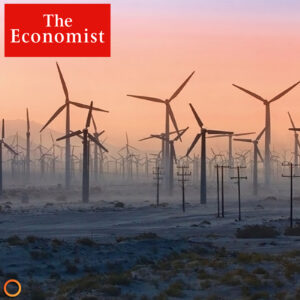An article featured in The Economist explores a number of approaches to rein in fossil fuel use in relation to the global climate crisis. The article includes several valid points and recommendations pursuant to a feasible energy transition while minimizing environmental harm.
Many nations around the world share the consensus that a climate crisis is approaching, and are aware of tangible steps that can be taken to align with ‘The Paris Agreement‘ goal of limiting global temperature rise to 1.5C above pre-industrial levels by 2050.
The article notes several challenges inhibiting the progression of renewables’ connection to grid systems and what may be required of fossil fuel producers over the following three decades.
“One priority is finding a way to ramp up fossil-fuel projects, especially relatively clean natural gas, that have an artificially truncated lifespan of 15-20 years so as to align them with the goal of dramatically cutting emissions by 2050. In particular, Europe and Asia, which must wean themselves off Russian gas and coal respectively, have too little liquefied natural gas (LNG) capacity. The trick is to get business to back schemes designed to be short-lived.”
For the time being, fossil fuels are the only viable means of achieving the energy transition. Evidently, the last two years have left almost every stakeholder group in energy markets bewildered as a result of the Russian invasion of Ukraine, supply chain disruptions, localized energy security, heated pipeline deliberations, and inflation, to name a few.
As noted in the article, “governments must improve the reach, capacity and storage capabilities of their grids and remove the obstacles that continue to make it harder to add renewable capacity than it should be. The design of power grids and markets is squarely a matter for governments and they are too often trapped in 20th-century thinking”
Continued, “21st-century thinking turns on new ways to provide smart, resilient grids with the zero-carbon “firm” power that makes dependence on renewables safe and effective.”
The article mentions a number of specific recommendations to bolster investor sentiment by providing a more predictable energy future, reducing regulatory processes, and “mandate the phasing out of dirty technologies” within a set period of time.
The International Energy Agency 10 Point Plan
Various stakeholder groups have voiced and published their concerns regarding the several challenges facing the energy industry as a whole over the next three decades. A problem with endless complexities, few organizations have the capacity to see all of the moving parts, and address the whole market with actionable steps, one being a 10-point plan developed by the Internal Energy Agency (IEA).
The IEA’s plan focuses on reducing reliance on and demand for oil around the world. The plan was drafted as a result of the Ukraine invasion, which threw the supply of oil for a loop and brought energy security to the forefront for many nations.
As stated on the IEA website, “If fully carried out in advanced economies, the measures recommended by the IEA’s new 10-Point Plan to Cut Oil Use would lower oil demand by 2.7 million barrels a day within four months – equivalent to the oil demand of all the cars in China. This would significantly reduce potential strains at a time when a large amount of Russian supplies may no longer reach the market and the peak demand season of July and August is approaching. The measures would have an even greater effect if adopted in part or in full in emerging economies as well.”
While the noted points won’t have much effect on the broader challenges and goals facing the energy sector in the short term, it is one example of how stakeholder groups are using their resources for a better energy future.
UN Secretary-General António Guterres’ remarks to the Major Economies Forum on Energy and Climate
Another example is the forward-thinking approach by UN Secretary-General António Guterres in his remarks to the Major Economies Forum on Energy and Climate, in Washington, D.C. on June 17th, 2022. Directed toward the US president, he makes reference to the risk associated with the following decades of energy turbulence.
“The first duty of leadership is to protect people from clear and present dangers. Now, nothing could be more clear or present than the danger of fossil fuel expansion. Even in the short term, it doesn’t make political or economic sense. Yet, we seem trapped in a world where fossil fuel producers and financiers have humanity by the throat.”
During his statement, Guterres refers to the opportunities fostered by moving to a green economy, “If we can successfully replace finite, polluting fossil fuels with infinite renewable resources, we can make the energy equation add up. We can put stable prices and sustainable economic growth within reach. These renewable energy sources are already cheaper than fossil fuels and create three times more jobs.”
While a simplification of a multi-faceted problem, Guterres offers five clear steps to improving both the approach and regulatory process of advancing the transition to renewables.
“The time for hedging bets has ended. The world has gambled on fossil fuels and lost. That is why I have put forward a five-point plan for a renewable energy revolution:
- Treat renewable technologies as a freely available global public good.
- Expand and diversify renewable energy supply chains.
- Shift fossil fuel subsidies to vulnerable people that want to engage in the green economy.
- Reform bureaucracies to fast-track approval processes.
- Triple public and private investments in renewables to at least $4 trillion dollars a year.”
Awareness of climate risk is growing, and the nations who hold their cards close are seemingly folding under geopolitical polarity while their energy security continues to be at risk, affecting the quality of life of their citizens.
There is a call for locally produced 24/7 carbon-free energy that is ‘firm’, predictable, and massively scalable. In addition, anxiety over the climate crisis continues to demand clean energy with speedier implementation.
While the debate continues, betting on advanced geothermal may offer a resolution set for global awareness, political support, and play a critical role in avoiding a potential climate catastrophe.
To read the full article, “How to fix the world’s energy emergency without wrecking the Environment”, visit The Economist.



















